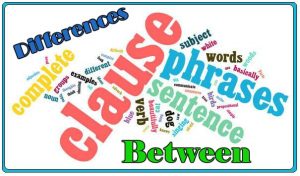Differences Between Clauses And Phrases

When it comes to writing, many people often wonder what are clauses and phrases. Questions such as what is a clause in a sentence or what is a phrase are inquiries that people want answers to. But what are the differences between them and how can you tell them apart? Let us delve into this grammar rule to see exactly how we can be able to tell differentiate between the two. Knowing the differences can help to make sure you do not make the mistake of using them incorrectly.
All About Clauses –
Clauses, or a clause in a sentence is a collection of words which contain both a subject and a verb. It is also a group of words containing a subject consistently executing a verb. There are two types of clauses or primary types. One is an independent clause that expresses a complete idea or thought. Because of that, it can stand by itself. The second one is a dependent clause and it needs an independent clause in order to be able to complete the sentence. It is also known as a subordinate clause. Since this subservient clause can only express a part of a thought or idea, it cannot stand on its own.
In most instances, dependent clauses often begin with words such as ‘because, since, if, when and although. There are four types of clauses; Non clauses, adverbial clauses, independent and dependent clauses and defining and non-defining clauses.
Some examples of ‘Independent clauses‘ which can stand on their own are:
He drives well.
I am really happy today.
Hector loves to write at night.
Unlike independent clauses, dependent clauses are not able to stand alone or on their own. Even though they may contain both a subject and a verb, they still do not express a complete thought or idea on their own. Remember that a dependent clause could never be a sentence.
Examples are:
When Hector loves to write….. (What happens when he does? We do not know so it is incomplete.)
Since I am feeling so happy today….
When they come over my house….
Angela wrote something…
As you can see, in each of these dependent clauses, we need more information in order to be able to know what happens. Something else is needed to makes these sentences, thoughts or ideas complete or independent.
All About Phrases –
Used in a single part of a speech or writing, a phrase is a group of two or more words expressing a concept without a subject-verb component. A phrase doesn’t have a combination of the subject and verb. In addition, it does not form a predicate as well.
Even though it will not contain a predicate or subject, the phrase can contain a verb or a noun. However, just like a dependent clause, a phrase could never stand alone as a sentence. Notwithstanding, it can still be close or within inside of clauses if they are dependent on the rest of the sentence. Or if they ar complete sentences on their own. Each time a phrase is nestled within a clause, it acts and functions as part of that speech or writing. Common types of phrases are as follows – appositive, infinitive, verb, gerund, participial, absolute and prepositional.
Lets us examine some examples below.
Late at night
Everyday the best friend arrives
While wearing the blue shirt
Party full of dancers
Leaving around the cat
As you can see from the examples above, all of these phrases are missing a subject doing a verb. They need something else to make them complete. The reason for this is because a phrase is not a complete sentence since it is missing a complete thought or idea. Try to keep this in mind when writing or making speeches. Using them incorrectly, can leave your targeted audience mis-informed or wanting more.
